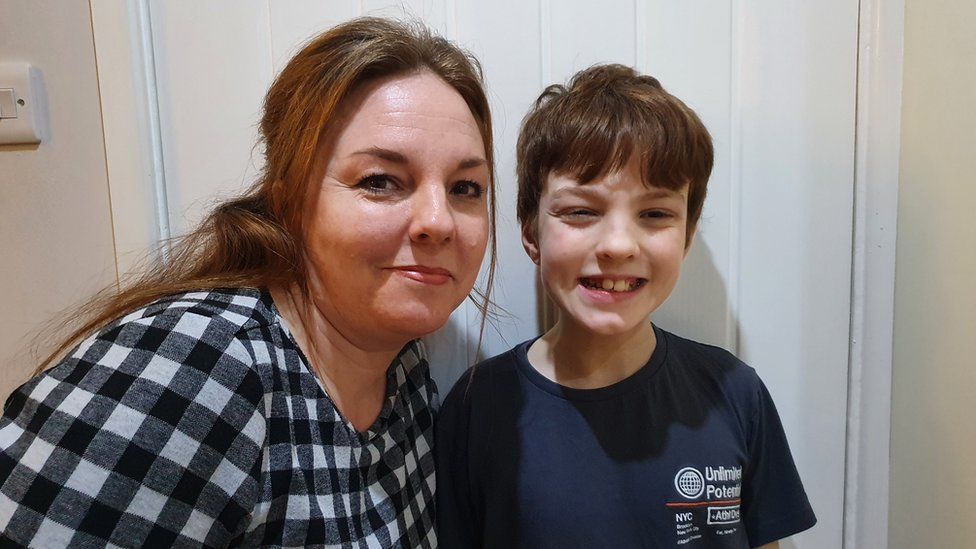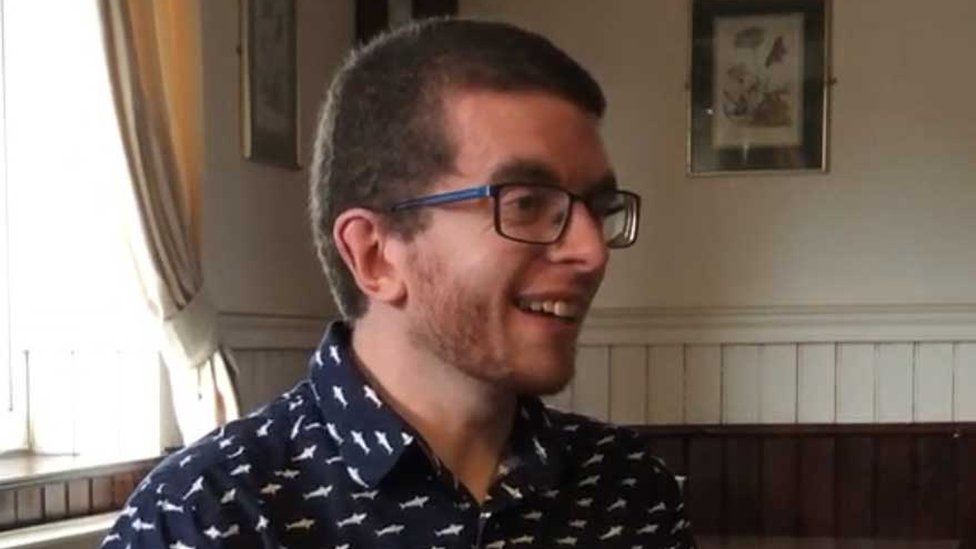
BBC presenter Xanthe Palmer has dyspraxia, a complex and life-changing disorder she says is frequently misunderstood. She wanted to change that, so set out to speak to others with the condition to shine a spotlight on the challenges they face.
Xanthe, now 23, was told she had dyspraxia - a lifelong condition affecting movement and co-ordination - when she was a 19-year-old university student. In some ways it explained a lot. "Clumsy", "fidgety" and "lazy" are labels often applied to people with dyspraxia, and ones that many without a diagnosis accept.
The most common symptoms affect motor skills and balance. Dyspraxia isn't linked to intelligence, but experts say it can interfere with executive functions such as time management and short-term memory. It's thought the extra concentration needed to perform everyday tasks can cause fatigue, and many with the condition describe feeling frequently exhausted.
Xanthe says: "You battle against it every single day. It isn't life threatening but it is life-changing."
Her own experience was the inspiration for a radio documentary. She spoke to doctors and professors. but also people around the UK who, like Xanthe, face their own daily battle with dyspraxia.
'It's not pretty in my head sometimes'
"I didn't really know what dyspraxia was, I'd never heard of it and I didn't realise that was what made me different or made me awkward or weird or clumsy," says Victoria Roberts.
"If there's something to fall over, or something to break or something to burn myself on or cut myself on I will do it."

The 50-year-old, from Sheffield, was not diagnosed until she was 40, and her co-ordination issues make her feel very self-conscious.
"Clumsiness can be quite cute, but it makes me feel like a battleship in full force and I am never going to be the most feminine person in the room," she says.
Her diagnosis did explain some of the issues she had in childhood and the struggles she had with handwriting. "I was never as graceful as some of my friends were. I was just mega, mega clumsy," she says.
Victoria describes her brain as a filing cabinet where, sometimes, a drawer jams and it cannot find the file it needs.
"It's not pretty in my head sometimes."
'A big mountain to climb'
According to the Dyspraxia Foundation, the condition affects about 5% of school-aged children, 2% severely. Eleven-year-old Jacob, from Doncaster, is one of them.
His mum, Tracie, says his obvious symptoms are related to his co-ordination. "Walking, talking, getting from A to B, organising ourselves... Jacob struggles with that," she says. "Everything has to be at a slower rate, everything has to be methodically thought out."
For Jacob it means working harder than somebody who is not dyspraxic, which Tracie says can be "exhausting" for him. And if his routine is disrupted or he forgets something then the day can quickly go downhill.
"It's not gone right, he can't get past that," Tracie says.

At its worst, Jacob's dyspraxia can have a knock-on impact upon his emotional wellbeing, and Tracie says he has mentioned wanting to hurt himself. "He's felt really, really down," she says.
"It's devastating. It's knowing that there is nothing you can do as a parent other than try and build up his self-esteem."
Symptoms continue into adolescence and adulthood in most cases, something that causes Tracie to worry for her son's future.
"I know he is going to face difficulties that I've faced, going from being a child to an adult. And I don't have any disabilities, so for him it is going to be a bigger mountain to climb than it ever was for me."
'Sometimes I'll write the day off'
The demands of dealing with daily life mean some with dyspraxia can find themselves unable to process all the information coming in, something Robert Hodge, an administrator from Plymouth, has experienced.
"When it comes to processing the world such as the environment, I can get overwhelmed with too much information," the 29-year-old says. "If am in a bright environment, lots of sound, lots of instructions, it can overwork my brain and it just shuts down."
Robert says he needs to have an escape route if he is going to a meeting or a new place in order to ease any anxiety.

"I just feel emotions more heavily," he says. "That includes positive ones. There can be times when I can have an overwhelming positive emotion that can cause me to shut down."
Like many others with the condition, Robert has so-called "dyspraxic days" when his co-ordination becomes a real issue.
"I will end up dropping everything, bumping into everything. Then I just write the day off and say 'tomorrow is a new day'," he says. "If I try to avoid having a dyspraxic day I think it just ends up making it worse. It is so exhausting to really be careful of every object."
'I am more than just dyspraxia'
Drag performer Raspberry the Dyspraxic Diva of Dundee describes her brain as "a monkey clanging cymbals".
"I am trying to get through life, I am trying to do it as smoothly as possible, but this monkey is clanging those cymbals whenever I am trying to have a sensible thought."
She describes it as one of the most "tedious" disabilities of all time. "It is always just there niggling in the background," she says.

The symptoms affect her speech, conversational flow and make it impossible to stand still, she says, things can imply a lack of confidence when performing.
"People look at you differently, they feel like they are seeing you crack a little bit," she says. "I may be dyspraxic, but I am a lot more than that."
"I want to be just as respected and just as admired, just a confident, strong person. It is frustrating, because sometimes I feel I have to prove that harder than anyone else."
Despite the difficulties faced by people with dyspraxia some like Robert Hodges could not imagine not having it.
"It's just a part of who I am, it's not something I could wish away, but I don't think I would want it permanently gone and without dyspraxia who would I be?"
It is a sentiment shared by Victoria Roberts.
"If I wished I didn't have dyspraxia that would be wishing I was somebody different and it's taken me a very long time to like who I am."
My Dyspraxic Life, presented by Xanthe Palmer, will be broadcast on 31 May at 09:00 BST on BBC Radio Sheffield and can be listened to in the UK here.

Follow BBC Yorkshire on Facebook, Twitter and Instagram. Send your story ideas to yorkslincs.news@bbc.co.uk.
Related Internet Links
"condition" - Google News
May 31, 2021 at 01:25PM
https://ift.tt/3p47p2k
Dyspraxia: My life with the misunderstood condition - BBC News
"condition" - Google News
https://ift.tt/2W6ON50
https://ift.tt/2L1ho5r
Bagikan Berita Ini

















0 Response to "Dyspraxia: My life with the misunderstood condition - BBC News"
Post a Comment